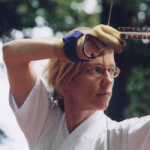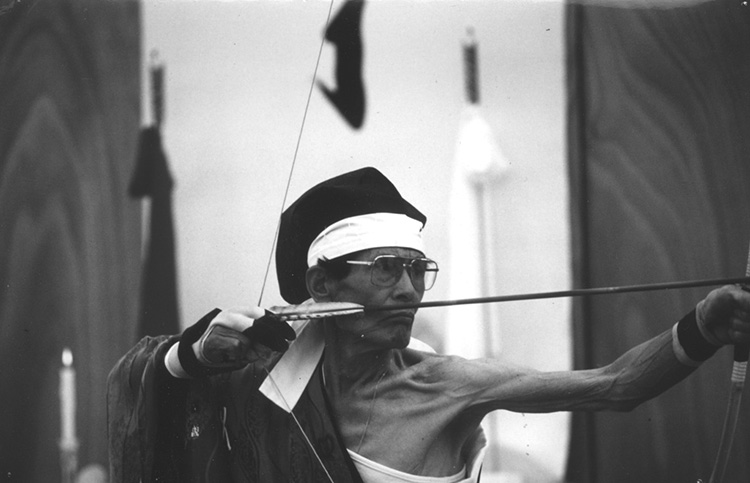This post was originally published at Ten Years, One Step on November 11, 2016.
The events this week are reverberating far and wide. Waking up Wednesday morning from a wave of anxiety dreams, my immediate and very unoriginal thought was, “Time to renew that Canadian passport!” And then, I remembered this:
One Thursday evening practice, in the summertime, we sat with the large kyudojo door open to the outside, flanked by two young women who had happened to drop by to watch. I don’t remember how they heard about Sensei or kyudo or why they felt compelled to come, but they gravitated towards him fearlessly.
At one point, one of the young women looked at him and asked, “Do you like living in America? Do you ever want to go back to Japan?”
Sensei replied succinctly, “I don’t make decisions based on ‘like’ and ‘not like’.”
Big pause. No one said a word.
The second memory to emerge was from September 11, 2013, the day of the massive Boulder flood. It kind of crept up on us. The rain had poured all night and by late morning it was clear we were in a crisis of some kind, but not yet clear what we could or should do about it. Answering a loud knock at the door, I faced an emergency responder.
“We understand you have an elderly person in the house. Is that true?”
“Yes,” I replied.
“You should evacuate immediately. The house next door has flooded and several houses along that street are full of water.” He pointed to the neighboring street to the north. “If one of the houses blows, you won’t have time to get out of here.” I thanked him profusely and dashed back to the kitchen to tell Sensei we needed to pack up immediately.
He sat very still, looked up at me from where he sat drinking his tea at the table and said, “Okay. But we should move slowly, slowly, no big hurry.”
I understood right then that he wasn’t referring to timing so much as state of mind, a directive not to get caught in the crisis mentality, but to move steadily, gently, deliberately. In all the years we were together, through various crises of health, environment, politics, kyudo student dramas, I never once saw him panic. So, we did move slowly, but economically, too.
We were out within an hour or so, with the dog, bird, wheelchair, oxygen machine, rice cooker and as much Japanese food as I could imagine being able to prepare in a hotel room. By the time we left the driveway, the streets were closing all around us. We had managed to reserve the last available room at a hotel in Broomfield. Crisscrossing our way, we approached a major intersection just as two road workers were putting a barrier in place to stop the traffic. It was the only road left to get us out of town.
“Please, we have to get through. I have an elderly man in the car and I need to get him to a hotel.” I made our case to the workers as quickly and emphatically as I could.
They took a look at Sensei in the passenger seat and waved us through, saying, “That’s it. You’re the last one,” and closed the road.
Sensei wasn’t always slow. He could be aggravatingly quick in the face of any kind of laziness, scattered overwhelm or “space out” from anyone in the environment and was almost always first to leave the house when we were going somewhere. Most of the time, I had to work to keep up with him. (Albeit, as the one handling a lot of earthly details, like packing and phone calls, there were reasons it took me longer.) Nonetheless, he imparted much in his demeanor, unswayed by the push-pull of ordinary anxieties or the compulsion for self-preservation.
At this moment, the recollection of his “slowly, slowly” has restrained me from bolting for the border or quickly making plans of any kind. If and when plans do emerge, may they arise from a place untainted by “like” or “not like,” the small-minded impulse towards self-preservation. And together, neither paralyzed by overwhelm nor driven by the force of panic or predjudice, may we gently carve a path through the storm.
 Carolyn Kanjuro served Kanjuro Shibata XX for the last decade of his life as his wife and translator, virtually 24/7 at his side. The richness of this decade and the reverberation of his teachings remain with her and she hopes some of it can come through in her site Ten Years, One Step – Teachings from Kyudo Master Kanjuro Shibata XX. Upon meeting Chögyam Trungpa Rinpoche at the age of nine, Carolyn embarked on a Buddhist path. Alongside this, she studied experimental theater at NYU, founded a troupe of young performers in Halifax, Nova Scotia, and was Creative Director and writer for a media production company for fifteen years. Currently, she works as a freelance writer and content/communications specialist in a variety of media.
Carolyn Kanjuro served Kanjuro Shibata XX for the last decade of his life as his wife and translator, virtually 24/7 at his side. The richness of this decade and the reverberation of his teachings remain with her and she hopes some of it can come through in her site Ten Years, One Step – Teachings from Kyudo Master Kanjuro Shibata XX. Upon meeting Chögyam Trungpa Rinpoche at the age of nine, Carolyn embarked on a Buddhist path. Alongside this, she studied experimental theater at NYU, founded a troupe of young performers in Halifax, Nova Scotia, and was Creative Director and writer for a media production company for fifteen years. Currently, she works as a freelance writer and content/communications specialist in a variety of media.
One Comment


 (802) 633-2384
(802) 633-2384
Thank you Caroline for this beautiful story and for sharing the richness of your time with him. It brought tears to my eyes. I realise I really miss Sensei although I only ever saw him three times.